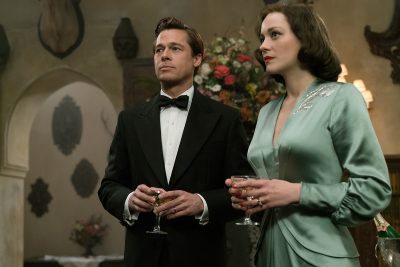
The first shot of “Allied,” Robert Zemeckis’ new romantic thriller, is one of its best. What seems like a panorama of the Moroccan desert suddenly becomes a tracking shot: our hero Max (Brad Pitt) is descending on a parachute to the rolling hills below. Clearly, Zemeckis is trying to calibrate our senses for what’s to come: nothing is as it initially seems, and even beautiful things can surprise us.
“Allied,” released Wednesday, is really two films stitched together by a grand romance of the transcendent widescreen variety. The first third of the film, a pulse-quickening thriller unto itself, takes place in Casablanca and introduces Max to a French freedom fighter named Marianne (Marion Cotillard) who is railing against Vichy forces. Max has descended from the sky to pose as her Parisian husband, and together they’re tasked with bringing down a high-ranking Nazi official stationed in Morocco.
This portion of “Allied” is, in a word, ravishing. It works. The ornate sets, artificial and totally transporting, whisk us away not to anything resembling real-life World War II Africa, but to an almost tactile world of cinematic artifice.
Signs glow a little brighter, streets bend a little neater, everyone’s dressed like they’re in a wonderful dream. On several occasions, Max and Marianne leave the city and head back to the desert, where the sand is mouthwateringly yellow and unblemished.
Zemeckis has always been a supremely populist filmmaker, and he exploits those tendencies to their most luxurious ends while “Allied” is in Casablanca — save, perhaps, what is sure to become one of the film’s most talked-about scenes, which involves some “Titanic”-level lovemaking and a CGI sandstorm.
Where “Allied” loses its footing is in the transition from film one to film two. Even more unfortunately, film two lasts for far longer than film one.
After Max and Marianne successfully complete their mission — big surprise, their faux-feelings begin to take over — they fall in love. This leads Marianne to follow Max back to London, marry him and begin a life together that remains relatively untangled by the ongoing war. They get married, have a daughter and settle down. But can two people whose livelihoods come from deceit ever truly trust one another?
The ultimate problems that plague “Allied” are twofold, and oddly, they don’t have much to do with structure. Sure, there’s a certain sense of dropped excitement when the film switches locations, but compelling things happen in both places. It still looks beautiful, though there’s a certain sense of exhaustion in a beautifully rendered London that doesn’t exist for a beautifully rendered Casablanca.
First, Brad Pitt is not good in this movie. It would even be appropriate to say that he is bad. It’s not his fault, really: the script, by “Locke” writer Steven Knight, underwrites Max to a near-lunatic degree. He is tall and he is stoic and he plays by the rules. And, he’s in love. It’s truly a nothing part, and it would be nice to say that Pitt does his best with it, but even that is perhaps too kind. He mostly just lumbers around like a formidably sized maple tree and desperately pleads with strangers.
The other issue, which is somehow even more damning than a wet blanket for a hero, is that the love story that drives “Allied” feels totally airless. Cotillard is mysterious, hard-eyed and slips layers into every glance she gives, but there are maybe three moments in the film’s two-hour runtime when a sane observer would believe that she truly loves Max.
We know almost nothing about these people, aside from the fact that they hate Nazis and are in love, and the fact that the former doesn’t lead to the latter becomes a significant detriment to the whole enterprise.
All of this is not to say that “Allied” is a bad film. Setting aside the strengths of its first third, Zemeckis scores a handful of genuinely harrowing moments as Max begins to question where Marianne’s loyalties lie. He’s clearly channeling Alfred Hitchcock movies like “Notorious” and “Sabotage” with this tale of domestic distrust, and while he never scales those heights, the premise is inherently interesting. One particular scene revolving around Max, Marianne and a piano kept the knuckles in the auditorium plenty white.
Unfortunately, moments of effective suspense do not a romantic thriller make. The film aims for a gut punch as a closer, and while it’s moderately affecting, there’s an unshakeable sense that everyone behind the camera thought it would hit harder than it does. Even as we gasp at the twists and turns of the plot, there’s very little sense of genuine surprise that accompanies us out of the theatre.
In the end, it’s more like a series of set pieces strung together by a loose sense of intrigue than an affecting journey, and that ends up sinking the picture: it generates plenty of tension, but not nearly enough heat.























































































































